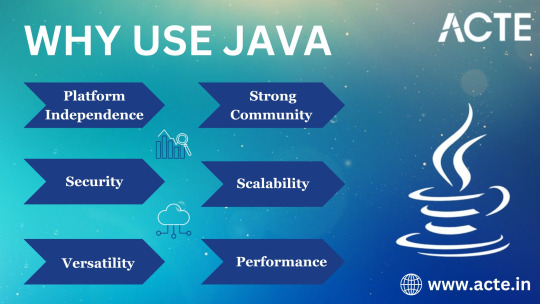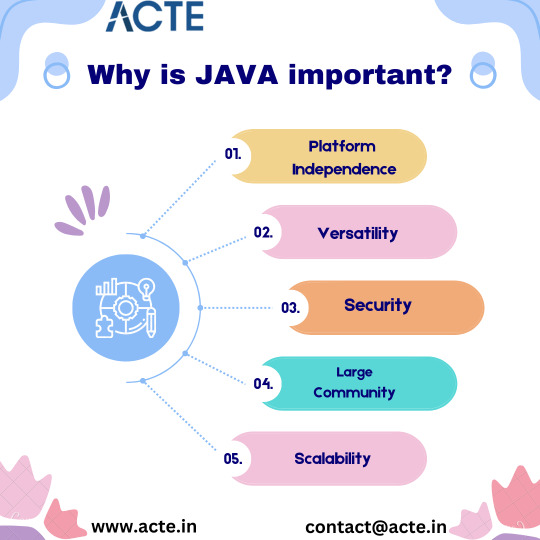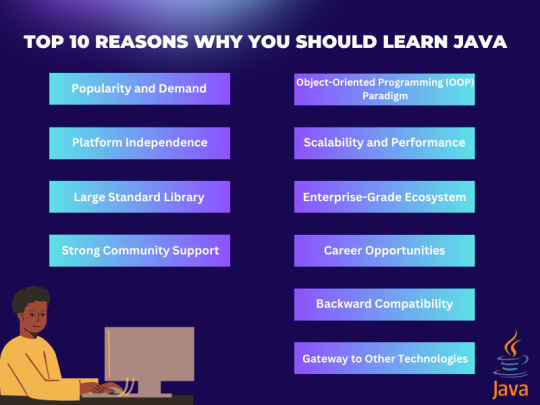#why java is platform independent
Explore tagged Tumblr posts
Text
The Importance and Benefits of Learning Java Programming
Hello everyone! If you're considering learning a programming language, let me tell you why Java should be at the top of your list! Java is a versatile language used worldwide in various projects, from computer programs to web development and Android app creation. Learning Java opens up many career opportunities as Java developers are in high demand across industries. For students who want to go into the IT field, java programming helps them to achieve that goal. Java simply helps us to know the difference between Data and Information, and how you use it to make something.

Top 7 Benefits of Learning Java Programming
1- Widely Used Language
2- Simplicity
3- Easy to learn
4- Object-Oriented Programming (OOP)
5- Android App Development
6- Career Growth and Job Opportunities
7- For more points read the full blog
Importance of Learning Java Programming
1- Versatility
2- Career Opportunities
3- Platform Independence
4- Robustness and Reliability
5- Community Support and Resources
Conclusion
Java is like HUB for everything, it can help you to make in development in everything. Java supports setting a UTF universal text format that contains all the languages such as Japanese, English, Chinese, arbi, and more. It contains 65 thousand alphabets which is why Java knows every language. every For more information read our full blog on Learning Java: Importance & Benefits.
3 notes
·
View notes
Text
Why Java Still Reigns Supreme: A Deep Dive into Its Benefits
In the ever-evolving world of software development, choosing the right programming language can be a critical decision. Java is one language that has over the years continuously demonstrated its value. With a rich history and a thriving ecosystem, Java remains a top choice for developers of all levels of expertise.

In this blog post, we will delve into the reasons why you should consider using Java in your development projects, exploring its strengths, versatility, and the many advantages it offers.
1. Platform Independence: "Write Once, Run Anywhere"
One of Java's defining features is its remarkable platform independence. This characteristic is often encapsulated in the phrase "Write Once, Run Anywhere." What does this mean for developers? It means that Java applications can run on any platform that has a compatible Java Virtual Machine (JVM). Whether you're targeting Windows, macOS, Linux, or even mobile devices, Java provides consistent and reliable performance across different environments.
The beauty of this platform’s independence lies in its ability to save developers time and effort. Instead of writing separate code for each operating system or device, you can write your code once and deploy it everywhere. This significantly streamlines the development process and reduces the complexity of managing multiple codebases.
2. Strong Community and Ecosystem
Java boasts one of the most extensive and active developer communities in the world. This vibrant ecosystem is a testament to Java's popularity and longevity. It provides developers with a wealth of resources, including documentation, libraries, and frameworks. Whether you're a beginner or an experienced professional, you'll find that Java's community is both welcoming and supportive.
If you encounter challenges or need guidance, you can turn to the Java community for help. Online forums, discussion groups, and social media platforms are teeming with developers eager to share their knowledge and assist others. The wealth of resources and the willingness of the community to help are invaluable assets when working with Java.
3. Security: Prioritizing Safety
Security is a paramount concern in today's digital landscape, and Java takes this concern seriously. The language and its runtime environment include built-in security features designed to protect applications from common vulnerabilities. These features, combined with Java's strict type system and memory management, contribute to creating robust and secure applications.
Additionally, Java regularly receives updates and patches to address emerging security threats. Staying up-to-date with these updates is crucial for keeping your Java applications secure. The commitment to security makes Java an excellent choice for projects that handle sensitive data or require a high level of protection against cyber threats.
4. Scalability: From Small-Scale to Enterprise
Java's scalability is another compelling reason why developers choose this language. It excels in both small-scale and large-scale applications. Whether you're building a lightweight web app or a complex enterprise-level system, Java can handle the job with finesse.
For enterprise-level applications that demand reliability and performance, Java's robustness is particularly advantageous. It can effortlessly handle high loads and traffic, making it a trusted choice for businesses with critical software needs. The ability to scale up or down as needed ensures that Java remains a versatile tool for a wide range of projects.
5. Versatility: More Than Just Coffee
Java's versatility sets it apart from many other programming languages. While some languages are specialized for specific types of applications, Java can do it all. It's equally suitable for web development, mobile app development, desktop applications, and backend services. This adaptability is invaluable in today's multi-platform development landscape, where projects often require a mix of technologies.
Whether you're building a responsive web application using Java's robust frameworks like Spring Boot or developing Android mobile apps with Android Studio, Java has you covered. The ability to work seamlessly across various domains makes Java a versatile tool in the hands of developers.
6. Performance: From Strength to Strength
Java's performance has seen significant improvements over the years, thanks to ongoing enhancements and optimizations. With its Just-In-Time (JIT) compilation and efficient memory management, Java applications can deliver impressive speed and responsiveness. Here are a few key factors contributing to Java's performance prowess:
JIT Compilation: Java's JIT compiler translates bytecode into native machine code just before execution. This process results in faster execution speeds compared to interpreted languages.
Garbage Collection: Java's automatic memory management system, including garbage collection, ensures efficient memory allocation and deallocation. This reduces the risk of memory leaks and contributes to overall performance.
Optimizations: The Java Virtual Machine (JVM) has evolved to incorporate various optimizations, such as inlining, loop unrolling, and escape analysis. These optimizations further enhance Java's runtime performance.
Multithreading: Java provides robust support for multithreading, allowing applications to take full advantage of modern, multi-core processors.

The continual evolution of Java means that it remains a competitive choice in terms of performance, even in the face of new programming languages and technologies.
In conclusion, Java's enduring popularity is no accident. Its platform independence, strong community, security features, scalability, versatility, and performance make it a standout choice for a wide range of development projects. Whether you're a seasoned developer or just starting your programming journey, Java has much to offer.
As you embark on your Java development journey, consider enhancing your skills with the help of ACTE Technologies in the field of Java training. ACTE Technologies is renowned for its high-quality training programs, designed to empower individuals with the knowledge and skills needed to excel in the competitive world of software development. Their courses cover a wide range of technologies, including Java, ensuring that you receive the best education and preparation for a successful career in the field.
In a constantly evolving tech landscape, Java remains a steadfast and powerful choice. Its versatility, coupled with the support of a strong community and educational resources like ACTE Technologies, can help you unlock your full potential as a developer and create innovative solutions that impact the digital world. Embrace Java, and join the ranks of developers who have harnessed its power to build exceptional software.
7 notes
·
View notes
Text

Why Choose Java?
There are several features of Java due to which Java is popular for software development.
Simple Object-Oriented Portable Platform independent Secured Robust Architecture neutral Interpreted High Performance Multithreaded Distributed Dynamic
#besttraininginstitute#onlinetraining#traininginstitute#online#education#training#tutorial#coding#programming#database#java#javalanguage#javaprogramming#code#trending#technology#tech#engineering#software#development#softwaredevelopment
2 notes
·
View notes
Text
Unleashing the Potential of Selenium Automation: An In-Depth Exploration
Introduction: In the dynamic realm of software development, efficiency and reliability are non-negotiable. With the proliferation of web applications, the demand for robust testing solutions has reached new heights. Enter Selenium – a versatile open-source test automation framework that has transformed the landscape of software testing. In this comprehensive exploration, we'll delve into the multitude of advantages offered by Selenium automation and delve deeper into why it has become the preferred choice for testers and developers worldwide.

1. Seamless Cross-Browser Compatibility: Selenium automation stands out for its seamless cross-browser compatibility feature. Testers can effortlessly execute tests across various web browsers such as Chrome, Firefox, Safari, and Edge. This ensures uniform performance across different platforms, minimizing compatibility issues and enhancing user experience.
2. Platform Flexibility and Independence: A standout feature of Selenium automation is its platform flexibility and independence. Tests crafted with Selenium can be run on diverse operating systems including Windows, macOS, and Linux. This versatility empowers teams to conduct testing on their preferred platforms, fostering collaboration and efficiency.
3. Multilingual Support for Enhanced Productivity: Selenium offers support for multiple programming languages including Java, Python, C#, and JavaScript. This multilingual support enables testers to write automation scripts in their language of choice, maximizing productivity and leveraging existing programming expertise.
4. Promoting Reusability and Ease of Maintenance: Selenium promotes code reusability and ease of maintenance through modular test design and adoption of design patterns like the Page Object Model (POM). By breaking down tests into smaller, reusable components, testers can streamline maintenance efforts and enhance scalability.
5. Accelerating Regression Testing Processes: Automation with Selenium significantly accelerates regression testing, allowing testers to detect and rectify bugs early in the development cycle. Seamless integration with continuous integration (CI) pipelines enables automatic execution of test suites, ensuring software stability and quality.

6. Comprehensive Test Coverage for Robust Applications: Selenium enables testers to achieve comprehensive test coverage by automating repetitive scenarios, edge cases, and boundary conditions. This meticulous testing ensures thorough validation of application functionality and user interactions, resulting in more robust software products.
7. Scalability and Parallel Execution Efficiency: Selenium facilitates parallel execution of tests across multiple browsers and environments, enabling teams to scale automation efforts effectively. By distributing test execution across different machines or virtual environments, testers can expedite the testing process and achieve faster feedback cycles.
8. Streamlined Integration with CI/CD Pipelines: Seamless integration with continuous integration/continuous deployment (CI/CD) pipelines enables automated testing as an integral part of the software delivery process. Automated build verification tests (BVTs) and regression tests ensure software stability, facilitating faster and more frequent deployments.
Conclusion: In conclusion, Selenium automation offers a plethora of advantages that empower testers to streamline testing efforts, enhance software quality, and expedite the development lifecycle. From cross-browser compatibility and platform independence to scalability and CI/CD pipeline integration, Selenium has redefined software testing in the modern era. By harnessing the power of Selenium, organizations can achieve faster releases, superior software quality, and heightened customer satisfaction, gaining a competitive edge in the ever-evolving digital landscape.
2 notes
·
View notes
Text
Unleashing the Power of Java: Your Guide to a Versatile Programming Language
Java: The Language of Digital Choreography
Programming languages are like the words we use to communicate with computers, and among these languages, Java stands out as a versatile and powerful tool. Imagine it as teaching your computer to dance to your tune, where your instructions are written in Java. But what makes Java so special, and why is it so widely embraced in the world of programming? Let's dive into the key reasons behind its importance.

1. Platform Independence: Java's Superpower
Java possesses a superpower—it can run on various computer systems without requiring modifications. How? Java programs are transformed into bytecode, a universal language understood by the Java Virtual Machine (JVM). This bytecode runs seamlessly on Windows, Mac, or Linux, making Java truly platform-independent.
2. Versatility: The Swiss Army Knife of Programming
Java is like a Swiss Army knife for programmers. It's not limited to one domain; you can use it to craft web applications, mobile apps, desktop software, and even embed it in small devices like smart thermostats. Its adaptability knows no bounds.
3. Security: A Robust Guardian
In an age where digital security is paramount, Java takes security seriously. It boasts built-in features that safeguard your computer and data from malicious software, providing peace of mind in our increasingly interconnected world.
4. Large Community: Your Support Network
The vast Java community is a valuable resource. With a multitude of Java developers out there, you can easily find help, access resources, and leverage libraries. If you encounter a coding challenge, chances are someone else has faced it and shared a solution.
5. Scalability: From Small to Massive
Java scales effortlessly. It's trusted by major corporations to power their colossal systems. Whether you're creating a small game or launching a massive e-commerce platform, Java can handle the challenge.

The Java Odyssey: Transforming Code into Digital Life
Understanding the inner workings of Java is paramount in the realm of programming. It unfolds as an intricate journey, a symphony of steps that bring your code to life, transforming instructions into digital ballet. Let’s delve deeper into this process:
1. Composition of Code: The Birth of Instructions
The journey commences with the composer, the programmer, crafting Java code that resonates with human understanding. It’s akin to writing the script for a grand performance, where every line of code becomes a note in the symphony of instructions.
2. Compilation: The Translator’s Artistry
Your code embarks on a transformative voyage known as compilation. This step resembles a skilled translator rendering a literary masterpiece into a universal language. The code metamorphoses into bytecode, a linguistic bridge that computers understand.
3. Bytecode: The Choreographer’s Notation
Bytecode emerges as the choreographer’s notation — a graceful set of instructions, akin to dance moves meticulously notated on a score. The Java Virtual Machine (JVM) is the dance floor, and bytecode is the choreographic masterpiece. It is platform-agnostic, a language that speaks fluently on any stage where a JVM is present.
4. Execution: The Grand Performance
The Java Virtual Machine takes center stage, assuming the role of the conductor and principal dancer. It orchestrates the grand performance by executing the bytecode on the target computer. This is where your program comes to life, faithfully translating your meticulously crafted instructions into tangible actions.
The Call to Adventure: Java Awaits
Now, are you ready to embark on the captivating adventure of Java? It beckons with the promise of exploring boundless possibilities and orchestrating digital feats. Java’s prowess extends across a myriad of applications, underpinned by its platform independence, fortified security, and the unwavering support of a vibrant community. If you harbor the eagerness to communicate with computers and guide them to perform incredible acts, Java stands as the perfect threshold.
Java is your gateway to a world where code transforms into enchanting performances, where the mundane becomes extraordinary. It is here that your journey unfolds, a journey of endless creativity and digital choreography that awaits your creative touch. Step onto the Java stage, and let your programming odyssey commence.
For those looking to deepen their understanding of Java, we strongly recommend exploring ACTE Technologies. Their qualified instructors can significantly enhance your learning journey, offering certificates and career placement opportunities. Whether you prefer online or offline access, ACTE Technologies provides a wealth of resources to help you master Java. Consider enrolling in one of their courses to embark on a step-by-step learning adventure.
#javacourse#javascript#javadevelopmentcompany#javaprogramming#javaprojects#best java developer jobs#best java training
4 notes
·
View notes
Text
Master Your Career with Full Stack Java Programming – Learn from the Best Platform for Courses

In today's competitive digital world, having a strong command over full-stack development can set you apart from the crowd. Among various technology stacks Full Stack Java programming stands out as a robust, reliable, and high-performance choice for web and enterprise application development. But where you learn it matters as much as what you learn. That’s why choosing the best platform for courses is the first step toward success.
Whether you're a fresher aiming to land your first tech job, a working professional planning to upskill, or someone transitioning into a software development career, enrolling in a Full Stack Java programming course from a reputed platform can open the doors to immense opportunities.
What is Full Stack Java Programming?
Full Stack Java programming refers to the development of both the front-end (client-side) and back-end (server-side) of web applications using Java technologies. It typically includes learning:
Front-End Tools: HTML, CSS, JavaScript, React.js or Angular
Back-End Frameworks: Java, Spring, Spring Boot
Database Management: MySQL, MongoDB
Version Control: Git, GitHub
Deployment: Docker, Jenkins, AWS, etc.
This comprehensive approach empowers developers to build fully functional and scalable web applications from scratch.
Why Choose the Best Platform for Courses?
The best platform for courses ensures not only high-quality content but also real-world project experience, expert mentorship, industry-recognized certifications, and placement support. Here's what makes a platform the best:
Industry-Aligned Curriculum
Experienced Trainers
Hands-on Projects
Flexible Learning Modes (Online/Offline/Hybrid)
Affordable Pricing with EMI Options
Job Assistance or Internship Opportunities
Choosing the right platform can make your learning journey smoother, faster, and more rewarding.
Key Benefits of Learning Full Stack Java Programming
Here’s why Full Stack Java Programming is a game-changer for tech enthusiasts:
1. Versatility in Job Roles
Once you master both the front-end and back-end, you're eligible for a wide range of job roles:
Full Stack Developer
Java Developer
Back-End Developer
Software Engineer
Web Developer
2. High Demand in the Market
Java is one of the most used programming languages globally. Companies are constantly in search of skilled Full Stack Java Developers to handle end-to-end development.
3. Lucrative Salary Packages
Due to their diverse skill set, Full Stack Java Developers often command higher salary packages than specialists. Freshers can start with competitive salaries, while experienced professionals enjoy even more lucrative offers.
4. Complete Control Over Projects
As a full stack developer, you understand the complete architecture of an application, which allows you to contribute more effectively to the development lifecycle and take on leadership roles.
5. Better Freelance & Startup Opportunities
Freelancers and entrepreneurs benefit greatly from Full Stack Java skills. You can build entire applications independently or with a small team, reducing development costs and timelines.
6. Community Support and Resources
Java has a vast global developer community. Whether it’s troubleshooting, new trends, or open-source tools, you’ll always find help and support.
Why Our Platform is the Best Platform for Courses
Our learning platform is designed to empower you with job-ready skills and real-world knowledge. Here's what sets us apart as the best platform for courses:
✅ Comprehensive Java Full Stack Curriculum
✅ Expert Mentorship from Industry Professionals
✅ Real-Time Projects & Assignments
✅ Live Classes + Recorded Sessions
✅ Placement Assistance with Resume Building & Mock Interviews
✅ Internship Opportunities to Build Your Portfolio
✅ Certification Recognized by Top IT Companies
With flexible learning schedules, weekend classes, and doubt-clearing sessions, we ensure every student gets personalized attention and career guidance.
Final Thoughts
Full Stack Java Programming is not just a skill—it's a career-transforming toolkit that can help you become a valuable asset in any software development team. By choosing the best platform for courses, you're investing in your future with the right resources, mentorship, and career support.
Don’t wait to make the leap. Whether you're just starting out or planning your next career move, mastering Full Stack Java Programming with us can be your smartest decision yet.
🚀 Start your journey today — enroll now with the best platform for courses and become a certified Full Stack Java Developer!
0 notes
Text
Java Interview Questions and Answers: Your Ultimate Preparation Guide

That’s why we’ve created "Java Interview Questions and Answers: Your Ultimate Preparation Guide" to help you get fully prepared and stand out from the competition.
Java remains one of the most widely used programming languages across the tech industry. From building enterprise-grade applications to Android development and cloud-based systems, Java is a powerful, object-oriented language that has stood the test of time. As a result, Java continues to be a core requirement in thousands of job listings globally, and technical interviews often focus heavily on Java fundamentals, coding practices, and real-world problem-solving.
This guide offers a comprehensive breakdown of the most commonly asked Java interview questions, along with expert-level answers that explain not just the what, but the why—helping you build a strong conceptual foundation.
Why This Guide Matters
"Java Interview Questions and Answers: Your Ultimate Preparation Guide" is designed to equip you with the most relevant, up-to-date, and frequently asked questions across various job roles and experience levels. Whether you're a fresher just entering the field or a seasoned Java developer with years of experience, the questions included in this guide cover all the core areas expected in a Java interview.
With structured answers, real-world examples, and technical explanations, this guide helps you understand each topic in depth—so you’re not just memorizing, but truly learning.
Key Topics Covered in This Guide
Here are the primary categories of Java interview questions and answers covered in this ultimate preparation guide:
1. Core Java Basics
These questions test your fundamental knowledge of Java, including syntax, control structures, and data types. Examples include:
What are the main features of Java?
What is the difference between JDK, JRE, and JVM?
Explain the concept of platform independence in Java.
2. Object-Oriented Programming (OOP) in Java
As Java is built around the OOP paradigm, interviewers often assess your grasp of these principles:
What is encapsulation, and why is it important?
Explain inheritance with examples.
What is polymorphism, and how is it implemented in Java?
3. Exception Handling
Proper exception handling is critical in robust Java applications. Common questions include:
What is the difference between checked and unchecked exceptions?
How do try, catch, finally, and throw work together?
What is the purpose of custom exceptions?
4. Collections Framework
This is a favorite topic in Java interviews due to its practical importance:
What is the difference between ArrayList and LinkedList?
How does HashMap work internally?
What are the differences between Set, List, and Map?
5. Multithreading and Concurrency
Java supports concurrent programming, and questions in this category test your knowledge of threading concepts:
What is a thread in Java?
Explain the differences between Runnable and Thread.
How do you avoid thread-safety issues in Java applications?
6. Java 8 and Beyond
Modern Java versions introduced features like lambdas, streams, and functional programming:
What are lambda expressions?
How do you use the Stream API in Java 8?
What is the difference between Optional and null?
7. JVM Internals and Memory Management
Senior-level candidates are often expected to understand how Java works under the hood:
How does garbage collection work in Java?
What are the different memory areas in JVM?
How can memory leaks be detected and avoided?
8. Design Patterns and Best Practices
To demonstrate architectural thinking, candidates may be asked:
What is the Singleton pattern and how do you implement it?
Explain the Factory and Observer patterns.
What are SOLID principles in Java programming?
Sample Questions from the Guide
Here are a few samples from "Java Interview Questions and Answers: Your Ultimate Preparation Guide":
1: What is the difference between ‘==’ and .equals() in Java? Ans: == checks reference equality, meaning whether two references point to the same object. .equals() checks logical equality, meaning whether two objects have the same value. For example, two different String objects with the same value will return true using .equals() but false using ==.
2: What is a HashMap, and how does it work internally? Ans: A HashMap stores key-value pairs. It uses a hash function to compute an index where the value should be stored in an array. If multiple keys hash to the same index, Java handles collisions using a linked list or a balanced tree (as of Java 8).
3: How does Java achieve platform independence? Ans: Java code is compiled into bytecode by the Java compiler. This bytecode is platform-independent and can be executed by the Java Virtual Machine (JVM), which is available on multiple operating systems.
How to Use This Guide for Effective Interview Prep
To get the most out of "Java Interview Questions and Answers: Your Ultimate Preparation Guide", follow these steps:
Study the concepts – Don’t just read the answers; understand the reasoning behind them.
Practice coding – Use platforms like HackerRank, LeetCode, or Codeforces to apply Java in real coding problems.
Mock interviews – Simulate real interview scenarios with peers or mentors to practice verbalizing your thoughts.
Build small projects – Implement real-world solutions to solidify your understanding of Java concepts.
Keep learning – Stay up-to-date with Java updates and community discussions to stay ahead of the curve.
Conclusion
Preparation is key to succeeding in a Java interview, and "Java Interview Questions and Answers: Your Ultimate Preparation Guide" is your all-in-one resource for that journey. By mastering the topics covered in this guide, you'll gain the confidence and knowledge needed to impress your interviewers and secure your desired role in the tech industry.
0 notes
Text
Fuel Your Coding Journey with Full Stack Development Mastery
In today’s fast-paced digital world, technology is evolving rapidly—and so are the demands for skilled developers who can build, optimize, and maintain both the front-end and back-end of web applications. This is where full stack development enters the spotlight. If you’re aspiring to become a well-rounded developer, it’s time to fuel your coding journey with full stack development mastery.
Mastering full stack development opens doors to a variety of career paths in software engineering, product development, and tech entrepreneurship. Whether you're a beginner or an experienced programmer, choosing the right training institute plays a crucial role in shaping your future.
What is Full Stack Development?
Full stack development refers to the ability to work on both the client-side (frontend) and server-side (backend) of web applications. A full stack developer is a versatile professional capable of building complete, functional, and scalable digital products.
The core components of full stack development include:
Frontend Technologies: HTML, CSS, JavaScript, React, Angular
Backend Technologies: Java, Node.js, Python, PHP
Databases: MySQL, MongoDB, PostgreSQL
Version Control Systems: Git, GitHub
Deployment & DevOps: Docker, Jenkins, AWS
A comprehensive understanding of these technologies allows developers to create seamless and user-friendly applications from start to finish.
Why Choose Full Stack as a Career?
The demand for full stack developers continues to grow as companies seek professionals who can manage complete project lifecycles. Here are some compelling reasons to fuel your coding journey with full stack development mastery:
Versatility: Ability to work on multiple layers of technology.
High Demand: Recruiters prefer candidates who can take ownership of both backend and frontend tasks.
Lucrative Salaries: Skilled full stack developers command competitive compensation.
Entrepreneurial Edge: Perfect skillset for launching tech startups or freelance projects.
Job Security: Wide range of industries need full stack expertise, from fintech to healthcare.
How to Start Your Full Stack Development Journey?
The first step is choosing the best full stack development training institute in Pune or your local area. Pune, being a rising IT hub, is home to several reputed institutes offering hands-on training with real-world projects.
A quality training institute should offer:
Practical Learning: Focus on live projects and real-time development.
Experienced Faculty: Mentors with real industry experience.
Career Support: Resume building, interview prep, and placement assistance.
Certifications: Industry-recognized credentials that enhance your profile.
Why Java is Still Relevant in Full Stack?
Even though newer technologies are emerging, Java continues to be a cornerstone in enterprise-level development. It is stable, secure, and widely used in backend systems.
If you’re starting from scratch or looking to strengthen your backend development skills, enrolling in a Java training institute in Pune can be a great foundation. Java-based frameworks like Spring Boot and Hibernate are still highly in demand in full stack job roles.
Benefits of Learning Java for Full Stack Development:
Robust and platform-independent.
Easy integration with front-end frameworks.
Strong community support and libraries.
Powerful tools for backend development.
What Makes Pune a Learning Hotspot?
Pune has emerged as a favorite destination for aspiring developers due to its balance of affordable education and booming tech industry. With the presence of numerous MNCs and startups, Pune provides a dynamic environment for learners.
When looking for the best full stack development training institute in Pune, make sure the institute provides:
Updated curriculum aligned with industry needs.
Mentorship from software architects and engineers.
Job placement records and success stories.
Internship opportunities with local IT firms.
Features to Look for in a Full Stack Course
Before enrolling, ensure the course offers:
Complete Stack Coverage: HTML5, CSS3, Bootstrap, JavaScript, React, Node.js, Express.js, MongoDB/MySQL, Git.
Project-Based Learning: Build projects like e-commerce platforms, dashboards, or portfolio websites.
Interactive Classes: Regular assessments, code reviews, and Q&A sessions.
Capstone Projects: Opportunity to showcase your skills through a final project.
Kickstart Your Journey Today
Whether you’re passionate about building web apps or aiming for a career switch, full stack development is the ideal launchpad. It equips you with everything you need to stand out in today’s competitive job market.
Remember, the right mentorship can make all the difference. Seek out a Java training institute in Pune that also offers full stack development programs. Or better, opt for the best full stack development training institute in Pune that gives you exposure to multiple technologies, industry insights, and placement opportunities.
Final Thoughts
It’s not just about learning to code; it’s about transforming the way you think and create digital solutions. When you fuel your coding journey with full stack development mastery, you equip yourself with tools and knowledge that go beyond theory.
Take the leap. Choose the right course. Surround yourself with the right mentors. And soon, you’ll not just be coding—you’ll be building, innovating, and leading the digital future.
0 notes
Text
Best Java Course in Jalandhar
In the very hub of Punjab, Jalandhar is finding its place as a premier IT training educational hub. Out of all the technical courses being offered, Java is one of the most sought-after programming languages. Should you be looking for the #bestjavacourse to get your programming career started or give it a boost, TechCadd is the one name in Jalandhar that rules them all.
Why Learn Java? Java is an enterprise-level, platform-independent language that is being employed all over the world to develop secure, scalable, and portable applications. Learning Java creates opportunities in development, testing, as well as automation careers.
Why TechCadd Provides the #bestjavacourse TechCadd is recognized as one of the top IT training institutes in Jalandhar, known for its quality education and industry-focused programs. Their #javacourse is particularly tailored to suit the demands of today's industry. From #basicjavatraining to advanced topics, TechCadd ensures that every student develops a strong foundation and acquires actual coding skills.
What TechCadd Offers: Experienced Trainers: Training by Java-certified experts with years of hands-on experience.
Project-Based Learning: Acquire practical expertise by implementing real-time projects and assignments.
Job-Oriented Curriculum: Core Java, object-oriented programming, exception handling, JDBC, and more are covered in the course to prepare students for job interviews and placements.
Flexible Timings: Flexible class timings are available with TechCadd regardless of whether you are a student or a working individual.
Placement Assistance: Career counseling and interview sessions are provided by the institute to help students secure placements in top IT companies.
Who Should Join This Java Course? If you're a beginner seeking #basicjavatraining, TechCadd has step-by-step training to assist you in developing programming logic from ground level. For individuals with some existing coding background, the course goes in-depth into Java themes and frameworks.
If you're a student, a job candidate, or a professional aiming for a career shift, this #javatraining program will provide you with the tools to achieve success in today's competitive tech world.
Why Jalandhar? Jalandhar has emerged as a hub for IT training in Punjab. With growing demand for software professionals in neighboring tech campuses such as Chandigarh, Mohali, and even Delhi-NCR, finishing your #javacourseinjalandher provides great value with value-for-money and convenience.
Join Today with TechCadd Having a strong record of student success and quality training, this is the #bestjavacourse that you can choose from.
Whether you're interested in learning the fundamentals or upskilling for a software development job, TechCadd's #javacourseinjalandher is your best bet.
visit now:
https://techcadd.com/best-java-course-in-jalandhar.php
0 notes
Text
Crack the Code: Why Learning Java Is Still One of the Smartest Career Moves in 2025
In a world of constantly changing tech trends—where Python, Kotlin, and JavaScript dominate discussions—Java continues to stand strong. And if you're a student or fresher looking to enter the tech industry, learning Java might just be your smartest investment yet.
Why? Because Java is everywhere. From Android apps to enterprise systems, banking software to back-end platforms—Java powers millions of applications used daily. And the demand for skilled Java developers isn't just staying steady; it's growing.
In 2025, Java remains a gateway to building a robust, long-lasting career in software development. And thanks to platforms like Beep, students now have access to hands-on, Java programming courses for beginners that are affordable, practical, and job-oriented.
Why Java Still Rules the Backend World
Some people wrongly assume Java is “old school.” But ask any senior developer, and you’ll hear the same thing: Java is battle-tested, secure, and versatile.
Here’s why companies continue to prefer Java:
Scalability: Perfect for high-traffic apps and large databases
Platform independence: “Write once, run anywhere” is still relevant
Community support: Millions of developers worldwide
Enterprise adoption: Banks, telecoms, logistics firms, and even startups love Java’s stability
Whether you're building a mobile app or designing a cloud-based ERP, Java offers the tools to scale and succeed.
What Makes Java Perfect for Beginners
You don’t need to be an expert to start with Java. In fact, many colleges use Java as a foundation for teaching object-oriented programming (OOP).
As a beginner, you’ll gain core skills that apply across languages:
Variables, data types, control structures
Classes, objects, inheritance, polymorphism
File handling, exception management
Basic UI development using JavaFX or Swing
Introduction to frameworks like Spring (as you advance)
This foundation makes it easier to switch to more specialized stacks later (like Android or Spring Boot) or even pick up other languages like Python or C#.
Where to Start Learning Java the Right Way
While YouTube and free tutorials are good for browsing, structured learning is better for job-readiness. That’s why Beep offers a beginner-friendly Java programming course that’s designed specifically for students and freshers.
What makes this course ideal:
It covers both basic and intermediate concepts
You build real-world projects along the way
You learn how Java is used in interviews and job scenarios
You get certified upon completion—great for your resume
It’s flexible and can be completed alongside college or internship schedules
And if you’re aiming for backend developer jobs, this certification is a strong step in the right direction.
How Java Helps You Land Jobs Faster
Hiring managers love candidates who know Java for one simple reason—it’s practical.
Java-trained freshers can apply for roles like:
Junior Software Developer
Backend Developer
QA Engineer (Automation Testing)
Android App Developer
Support Engineer (Java-based systems)
These roles often mention Java and SQL as core requirements, making it easier for you to stand out if you’ve completed a course and built some small projects.
Explore the latest jobs for freshers in India on Beep that list Java among the top preferred skills.
Build Projects, Not Just Skills
To truly master Java—and get noticed—you need to build and share your work. Here are some beginner-friendly project ideas:
Student registration portal
Simple inventory management system
Expense tracker
Quiz game using JavaFX
File encryption/decryption tool
Host these on GitHub and add them to your resume. Recruiters love seeing what you’ve created, not just what you’ve studied.
What About Java vs. Python?
This is a common question among freshers: Should I learn Java or Python?
The answer: learn based on your goals.
Want to work in data science or AI? Python is ideal.
Want to build robust applications, Android apps, or work in enterprise systems? Java is your best bet.
Also, once you understand Java, learning Python becomes easier. So why not start with the tougher but more rewarding path?
How to Prepare for Java Interviews
Once you’ve got the basics down and completed a project or two, start preparing for interviews with:
Practice problems on platforms like LeetCode or HackerRank
Study key Java topics: Collections, OOP principles, exception handling
Learn basic SQL (many Java jobs also require DB interaction)
Brush up on scenario-based questions
You can also check out Beep’s resources for interview prep alongside your course content.
Final Thoughts: Learn Once, Earn Always
Learning Java isn’t just about getting your first job—it’s about building a lifelong skill. Java has been around for over two decades, and it’s not going anywhere. From web to mobile to enterprise, Java developers are always in demand.
So if you're ready to start your tech journey, don't chase trends. Build a solid base. Start with the best Java course for beginners, practice consistently, and apply with confidence. Because a well-written Java application—and resume—can open more doors than you think.
0 notes
Text
Java's Lasting Impact: A Deep Dive into Its Wide Range of Applications
Java programming stands as a towering pillar in the world of software development, known for its versatility, robustness, and extensive range of applications. Since its inception, Java has played a pivotal role in shaping the technology landscape. In this comprehensive guide, we will delve into the multifaceted world of Java programming, examining its wide-ranging applications, discussing its significance, and highlighting how ACTE Technologies can be your guiding light in mastering this dynamic language.

The Versatility of Java Programming:
Java programming is synonymous with adaptability. It's a language that transcends boundaries and finds applications across diverse domains. Here are some of the key areas where Java's versatility shines:
1. Web Development: Java has long been a favorite choice for web developers. Robust and scalable, it powers dynamic web applications, allowing developers to create interactive and feature-rich websites. Java-based web frameworks like Spring and JavaServer Faces (JSF) simplify the development of complex web applications.
2. Mobile App Development: The most widely used mobile operating system in the world, Android, mainly relies on Java for app development. Java's "write once, run anywhere" capability makes it an ideal choice for creating Android applications that run seamlessly on a wide range of devices.
3. Desktop Applications: Java's Swing and JavaFX libraries enable developers to craft cross-platform desktop applications with sophisticated graphical user interfaces (GUIs). This cross-platform compatibility ensures that your applications work on Windows, macOS, and Linux.
4. Enterprise Software: Java's strengths in scalability, security, and performance make it a preferred choice for developing enterprise-level applications. Customer Relationship Management (CRM) systems, Enterprise Resource Planning (ERP) software, and supply chain management solutions often rely on Java to deliver reliability and efficiency.
5. Game Development: Java isn't limited to business applications; it's also a contender in the world of gaming. Game developers use Java, along with libraries like LibGDX, to create both 2D and 3D games. The language's versatility allows game developers to target various platforms.
6. Big Data and Analytics: Java plays a significant role in the big data ecosystem. Popular frameworks like Apache Hadoop and Apache Spark utilize Java for processing and analyzing massive datasets. Its performance capabilities make it a natural fit for data-intensive tasks.
7. Internet of Things (IoT): Java's ability to run on embedded devices positions it well for IoT development. It is used to build applications for smart homes, wearable devices, and industrial automation systems, connecting the physical world to the digital realm.
8. Scientific and Research Applications: In scientific computing and research projects, Java's performance and libraries for data analysis make it a valuable tool. Researchers leverage Java to process and analyze data, simulate complex systems, and conduct experiments.
9. Cloud Computing: Java is a popular choice for building cloud-native applications and microservices. It is compatible with cloud platforms such as AWS, Azure, and Google Cloud, making it integral to cloud computing's growth.

Why Java Programming Matters:
Java programming's enduring significance in the tech industry can be attributed to several compelling reasons:
Platform Independence: Java's "write once, run anywhere" philosophy allows code to be executed on different platforms without modification. This portability enhances its versatility and cost-effectiveness.
Strong Ecosystem: Java boasts a rich ecosystem of libraries, frameworks, and tools that expedite development and provide solutions to a wide range of challenges. Developers can leverage these resources to streamline their projects.
Security: Java places a strong emphasis on security. Features like sandboxing and automatic memory management enhance the language's security profile, making it a reliable choice for building secure applications.
Community Support: Java enjoys the support of a vibrant and dedicated community of developers. This community actively contributes to its growth, ensuring that Java remains relevant, up-to-date, and in line with industry trends.
Job Opportunities: Proficiency in Java programming opens doors to a myriad of job opportunities in software development. It's a skill that is in high demand, making it a valuable asset in the tech job market.
Java programming is a dynamic and versatile language that finds applications in web and mobile development, enterprise software, IoT, big data, cloud computing, and much more. Its enduring relevance and the multitude of opportunities it offers in the tech industry make it a valuable asset in a developer's toolkit.
As you embark on your journey to master Java programming, consider ACTE Technologies as your trusted partner. Their comprehensive training programs, expert guidance, and hands-on experiences will equip you with the skills and knowledge needed to excel in the world of Java development.
Unlock the full potential of Java programming and propel your career to new heights with ACTE Technologies. Whether you're a novice or an experienced developer, there's always more to discover in the world of Java. Start your training journey today and be at the forefront of innovation and technology with Java programming.
8 notes
·
View notes
Text

Top 10 Reasons Why You Should Learn Java Java is one of the most widely used programming languages in the world, known for its versatility and robustness. Java provides various features Have look at the top 10 reasons why you should learn Java: Popularity and Demand Platform Independence Large Standard Library Strong Community Support Object-Oriented Programming (OOP) Paradigm Scalability and Performance Enterprise-Grade Ecosystem Career Opportunities Backward Compatibility Gateway to Other Technologies
#besttraininginstitute#onlinetraining#traininginstitute#online#training#education#database#tutorial#coding#programming#java#top10#ten#topten#top#trend#trending#technology#educationplatform
2 notes
·
View notes
Text
Navigating Automated Testing with Selenium: A Comprehensive Overview
Introduction: In the dynamic landscape of software development, ensuring the reliability and performance of web applications is imperative. Enter Selenium, a powerhouse in the realm of automated testing, offering a suite of tools and libraries to streamline the testing process. In this article, we'll delve into the intricacies of Selenium, examining its features, advantages, and why it's a top choice for automated testing.

Exploring Selenium's Capabilities: Selenium serves as an open-source automation testing framework primarily designed for web applications. It equips testers with the ability to automate browser interactions, mimic user actions, and validate application behavior across different browsers and platforms.
Key Factors Driving Selenium's Adoption:
Seamless Cross-Browser Compatibility: Selenium's remarkable capability to conduct tests across various web browsers ensures uniform functionality and user experience across diverse platforms, a crucial aspect in today's interconnected digital world.
Embracing Open-Source Accessibility: A significant advantage of Selenium lies in its open-source nature, eliminating licensing barriers and making it accessible to organizations of all sizes. This democratization of automated testing promotes innovation and collaboration within the software development community.
Versatility in Programming Languages: Selenium offers support for multiple programming languages, including Java, Python, C#, Ruby, and JavaScript. This flexibility empowers testers to craft test scripts in their preferred language, fostering productivity and adaptability across diverse teams.
Flexibility and Scalability: One of Selenium's standout features is its flexibility and extensibility, allowing testers to tailor its functionality to suit specific testing needs. Whether integrating with existing frameworks or crafting custom test scenarios, Selenium adapts seamlessly to diverse testing requirements.

Integration into CI Pipelines: Selenium seamlessly integrates into Continuous Integration (CI) pipelines, automating testing processes and facilitating early bug detection. By embedding Selenium tests within CI workflows, organizations can enhance the efficiency and reliability of their software delivery pipelines.
Thriving Community Support: Selenium boasts a vibrant community of developers, testers, and enthusiasts, actively contributing to its development and evolution. This robust support network provides invaluable resources, documentation, and forums, fostering collaboration and knowledge sharing among users.
Comprehensive Testing Capabilities: Selenium offers a comprehensive suite of testing capabilities, encompassing functional testing, regression testing, performance testing, and compatibility testing. Its rich feature set enables testers to address a wide spectrum of testing scenarios effectively, ensuring the quality and reliability of web applications.
Platform Independence: Selenium's platform-independent nature enables it to run seamlessly across various operating systems, enhancing test portability and scalability. This versatility ensures consistent test execution across diverse environments, bolstering confidence in testing outcomes.
Conclusion: In conclusion, Selenium emerges as a stalwart in the realm of automated testing, driven by its cross-browser compatibility, open-source accessibility, language support, flexibility, integration capabilities, community support, comprehensive testing features, and platform independence. Whether you're a seasoned tester or a budding developer, mastering Selenium empowers you to navigate the complexities of automated testing with confidence and efficiency. As organizations strive for excellence in software quality and reliability, Selenium remains an indispensable tool in their arsenal, facilitating the delivery of robust and resilient web applications in today's digital landscape.
3 notes
·
View notes
Text
Top Programming Languages to Learn During BCA
The Bachelor of Computer Applications (BCA) is more than just a degree—it's your launchpad into the world of technology. If you're pursuing or planning to pursue BCA, you’re already on a smart path. But to truly stand out in today’s competitive tech landscape, knowing the right programming languages can make all the difference.

Let’s explore some of the must-learn programming languages during your BCA journey, whether you're in your first year or looking to skill up before placements.
1. Python – The Beginner's Best Friend
Python is often the first language taught at most reputed computer colleges for a reason—it's simple, powerful, and versatile. From web development to data science and artificial intelligence, Python is everywhere.
Why learn it? Easy syntax, huge community, tons of real-world applications.
Where it's used: AI, machine learning, automation, web apps.
Most tech-savvy campuses ensure students get hands-on Python experience in their early semesters.
2. Java – For Building Real-World Applications
Java is a classic language that powers countless enterprise applications and Android apps. Many universities emphasize Java due to its strong presence in the job market.
Why learn it? Object-oriented, platform-independent, in-demand.
Where it's used: Mobile development, banking software, web backends.
Students from institutions with a strong industry connection often get early exposure to Java through internships and live projects.
3. C and C++ – The Foundations of Programming
These are the languages where programming really began. While they might seem old-school, understanding C and C++ helps you think like a programmer and understand how computers work at a deeper level.
Why learn it? Improves logic building, system-level understanding.
Where it's used: Game development, operating systems, embedded systems.
Colleges that focus on building a strong technical foundation often introduce these languages early on.
4. JavaScript – The Language of the Web
If you're interested in web development, JavaScript is a must. It brings websites to life and is a key part of the front-end development trio: HTML, CSS, and JS.
Why learn it? Essential for web development, huge job market.
Where it's used: Websites, mobile apps (using frameworks like React Native).
In tech-forward academic environments, students often work on real-time web development projects that include JavaScript and modern frameworks.
5. SQL – The Language of Databases
Every software uses data. And SQL is the tool used to store, access, and manage that data. Whether you become a developer, analyst, or data scientist, SQL will be part of your toolkit.
Why learn it? Crucial for handling data, required in many job roles.
Where it's used: Databases, data analysis, backend development.
Educational institutions that prepare students for tech industry roles make sure database management is a part of the curriculum.
6. PHP – Still Relevant in Web Development
Despite newer frameworks, PHP remains a popular language for server-side web development, especially for content-heavy websites.
Why learn it? Widely used for building dynamic websites.
Where it's used: Web development, CMS (like WordPress).
Campuses offering full-stack development exposure often include PHP in their training.
Bonus Tip: Learn Version Control (Git)
While it’s not a programming language, knowing Git and GitHub will help you collaborate better, especially during internships or team projects.
Conclusion
Choosing the right programming languages to learn during BCA can open many doors. From academic excellence to career opportunities, mastering languages like Python, Java, and SQL can give you a strong edge.
And remember, the environment you study in also matters. Learning these languages becomes easier and more effective when you're surrounded by experienced mentors, real-world projects, and industry exposure. That’s why many students prefer institutions known for strong computer science programs and tech-focused learning. Some of the most dynamic campuses are located in educational hubs like Bangalore, where the blend of academia and industry gives students a clear advantage.
So, start learning, stay consistent, and by the time you finish your BCA, you'll be more than just job-ready—you’ll be future-ready.
0 notes
Text
Java in Software Development: A Timeless Language for Modern Solutions
Java has stood the test of time as one of the most popular and reliable programming languages in the software development world. From mobile apps to large-scale enterprise systems, Java powers countless digital solutions across the globe. Its platform independence, robust security features, and vast ecosystem have made it a top choice for developers for more than two decades.
What is Java?
Java is a high-level, object-oriented programming language developed by Sun Microsystems in the mid-1990s. It follows the “Write Once, Run Anywhere (WORA)” philosophy, meaning that code written in Java can run on any device equipped with the Java Virtual Machine (JVM), regardless of the underlying operating system.
Java’s syntax is clean, its structure is logical, and it borrows many ideas from C++, making it relatively easy to learn yet powerful enough for complex projects.
Why Java Still Matters in 2025
Despite the emergence of newer languages like Kotlin, Python, and Go, Java remains widely used for several compelling reasons:
1. Platform Independence
Java’s core strength lies in its platform independence. A compiled Java program can run on any device with a JVM, which includes everything from desktops to smartphones, embedded devices, and servers.
This portability makes Java an excellent choice for cross-platform development and enterprise applications.
2. Robust and Secure
Security is a top priority in software development, and Java is known for its strong security features. It offers a secure runtime environment, access control, and built-in protection against common vulnerabilities like buffer overflows.
Java’s robust memory management and automatic garbage collection also contribute to its stability and efficiency.
3. Rich API and Libraries
Java has a massive standard library (Java API) and a vast array of open-source libraries and frameworks. Whether you're building a web application, a game, or a machine learning tool, Java likely has a framework or toolset to support your work—Spring, Hibernate, Apache libraries, and JavaFX are just a few examples.
4. Community and Support
With millions of developers worldwide, Java has one of the largest and most active programming communities. This means continuous updates, widespread documentation, and countless tutorials that make problem-solving easier for both beginners and experienced professionals.
5. Enterprise Adoption
Many Fortune 500 companies and global enterprises continue to rely on Java for backend systems, banking software, e-commerce platforms, and more. The stability and scalability of Java make it a favorite for mission-critical applications.
Common Uses of Java in Software Development
Let’s take a look at some areas where Java continues to thrive:
1. Web Applications
Java is widely used in building dynamic web applications. Frameworks like Spring and JavaServer Faces (JSF) enable developers to create secure and scalable applications efficiently. Large websites and services like LinkedIn, Amazon, and eBay have backend systems partly powered by Java.
2. Android App Development
Java was the original language used for Android app development, and although Kotlin is now the preferred choice by Google, Java is still heavily used in the Android ecosystem. Most Android libraries are compatible with Java, and a significant portion of apps are still developed in or maintained with Java.
3. Enterprise Software
From banking to insurance to government sectors, Java is the backbone of many enterprise software systems. Technologies like Java EE (Enterprise Edition) provide the tools needed to build high-performance, distributed, and transaction-based applications.
4. Scientific Applications
Java’s precision, portability, and performance make it a good candidate for scientific applications. Its built-in mathematical and statistical capabilities are suitable for complex simulations and data analysis.
5. Big Data and Cloud Computing
Java plays a crucial role in the Big Data ecosystem. Tools like Hadoop and Apache Spark support Java, enabling developers to process massive amounts of data efficiently. Additionally, many cloud computing platforms like AWS and Google Cloud offer SDKs and tools for Java.
Learning Java in Today’s World
For those aspiring to enter the tech industry, learning Java is a smart move. It provides a strong foundation in object-oriented programming and helps you understand core programming concepts that are transferable to other languages.
The Future of Java
Java continues to evolve with each new release, improving performance, adding modern language features, and simplifying syntax. Features introduced in recent versions, like records, sealed classes, and pattern matching, show that Java is adapting to modern development trends.
As enterprises move toward cloud-native architectures, microservices, and DevOps, Java frameworks like Spring Boot and Jakarta EE are helping developers build faster, lighter, and more modular applications.
Conclusion
Java remains a powerful and versatile programming language with unmatched legacy and continued innovation. Whether you’re a student just starting out, a developer aiming to work in enterprise environments, or a tech enthusiast exploring mobile or web apps, Java offers tools and capabilities to support your goals.
In the ever-changing world of software development, Java proves that a well-designed language can continue to lead and inspire, even decades after its creation.
0 notes
Text
Top Java Interview Questions and Answers You Must Know in 2025

Preparing for a Java developer role? Whether you're a fresher or an experienced candidate, being well-versed with common Java interview questions can significantly boost your confidence and chances of landing the job.
In this blog, we’ll cover the most frequently asked Java interview questions along with quick answers and explanations.
📘 Looking for a complete, detailed list of Java interview questions? 👉 Check out the full guide here: Java Interview Questions – Freshy Blog
🔹 Why Java?
Before jumping into questions, let’s quickly recall why Java is such a sought-after language:
Platform independent
Strong community support
Object-oriented
Robust memory management
Used in web, mobile, and enterprise apps
🔸 Basic Java Interview Questions
What is Java? Java is a high-level, object-oriented programming language known for its platform independence via the Java Virtual Machine (JVM).
What are the main features of Java?
Object-Oriented
Secure
Portable
Robust
Multithreaded
What is the difference between JDK, JRE, and JVM?
JDK: Development kit for Java
JRE: Environment to run Java applications
JVM: Java Virtual Machine that executes code
🔸 OOPs & Core Concepts Questions
What is inheritance in Java? Inheritance allows one class to acquire properties and methods of another class using extends.
What is the difference between method overloading and overriding?
Overloading: Same method name with different parameters in the same class
Overriding: Same method signature in child and parent class
🔸 Advanced Java Interview Questions
What is a Java ClassLoader? A part of JVM that loads classes during runtime.
What is the difference between HashMap and Hashtable?
HashMap: Non-synchronized, allows one null key
Hashtable: Thread-safe, doesn’t allow null keys/values
Explain exception handling in Java. Using try-catch-finally blocks to gracefully handle run-time errors.
📚 Want More Questions with Answers?
These are just a few of the most asked Java questions. If you're preparing for interviews and want more in-depth explanations and examples:
🔗 Visit the full post here: 👉 https://www.freshyblog.com/java-interview-questions/
It includes:
Java 8 features
Multithreading questions
Collections framework
Spring Boot & JDBC-related questions
Real interview scenarios
✅ Final Tips for Java Interviews
Practice coding daily
Build sample projects
Revise OOPs and exception handling
Study frequently used Java libraries
#JavaInterviewQuestions#JavaJobs#TechInterview#JavaProgramming#JavaForFreshers#CodingInterview#FreshyBlog
0 notes